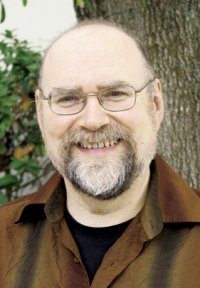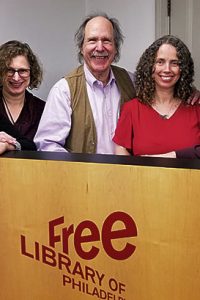Saladin Ahmed: Complicated Fantasy
 Saladin Ali Ahmed – ‘‘descended from Arabs and Irishmen’’ – was born in Detroit MI. He worked at a Dearborn MI library during high school before attending first Henry Ford College and then the University of Michigan in Ann Arbor, majoring in American Studies. He studied poetry at Brooklyn College, earning an MFA, then went to Rutgers University, where he received an MA in English with a focus on 18th century British literature and studied for a PhD. He later taught literature at Rutgers.
Saladin Ali Ahmed – ‘‘descended from Arabs and Irishmen’’ – was born in Detroit MI. He worked at a Dearborn MI library during high school before attending first Henry Ford College and then the University of Michigan in Ann Arbor, majoring in American Studies. He studied poetry at Brooklyn College, earning an MFA, then went to Rutgers University, where he received an MA in English with a focus on 18th century British literature and studied for a PhD. He later taught literature at Rutgers.
Before changing his focus to fiction, Ahmed was a serious poet, with work appearing in numerous literary journals, and was a member of Detroit’s National Poetry Slam Team in 1997 and ’98. His first SF story was ‘‘Where Virtue Lives’’ in Beneath Ceaseless Skies (2009), followed by Nebula Award finalist ‘‘Hooves and the Hovel of Abdel Jameela’’ (2009), ‘‘Judgment of Swords and Souls’’ (2009), ‘‘Doctor Diablo Goes Through the Motions’’ (2010), ‘‘General Akmed’s Revenge?’’ (2010), ‘‘Mister Hadj’s Sunset Ride’’ (2010), and ‘‘The Faithful Soldier, Prompted’’ (2010). Debut novel Throne of the Crescent Moon is forthcoming from DAW in 2012, and is the first of a projected trilogy. He is currently a finalist for the John W. Campbell Award for Best New Writer.
After a decade in New York, he recently relocated to a suburb of Detroit, where he lives with his wife Hayley Thompson (married 2007) and their twins, born 2010.
Website: Saladin Ahmed
“I was a fantasy reader throughout my youth. My father was a voracious reader who always had books around the house, and always made sure that I had books. He was a science fiction/fantasy reader too, so he brought me to Tolkien and Frank Herbert. I remember thumbing through Barlowe’s Guide to Extraterrestrials, the illustrated book of all these aliens from various science fiction series. He also had a lot of comic books around. So that’s what I grew up reading, and then I got into Dungeons & Dragons, stuff like that: all these pulpy adventure fantasy series.”
…
‘‘I knew enough from the poetry world that I was a strong believer in workshops, so I felt like I had to find a genre-specific workshop. I didn’t know about Clarion or any of the standard routes, so I just started poking around online. I found a thing that Walter Jon Williams and Connie Willis were running for the first year called Taos Toolbox, a two-week workshop specifically aimed at novel writing and (I didn’t know it then) also pitched as a kind of master class post-Clarion workshop.
‘‘I didn’t know I was applying ‘above my range,’ so to speak, so I sent Walter a sample and he accepted me for the workshop. It was wonderful! The experience was really illuminating in terms of some of the specific craft things about genre fiction, like tight point of view, pacing (things that reading a lot of literary fiction doesn’t necessarily train you for), and also professionalism. The two of them taught that class so well!
‘‘Walter Jon Williams is a fantastic teacher of plot and of crafting plots. If I’ve had any kind of success with plotting, it’s been under his tutelage. There are mechanisms for forcing the reader to keep turning pages, and they’re genre-specific. Only upon reflection do I realize that’s a great deal of why I like reading fantasy, and why I’ve gotten bored with some other kinds of fiction.”
…
“I can read bad sentences in a well-plotted book, and I can read a lackluster plot in a gorgeously written book. It’s when both things are missing that you’re in trouble! When both are there, you’re reading a great book. There are writers who have done both, like Fritz Leiber. Leiber is my hero! The wit that’s present in his prose is something that I wouldn’t dare think I’ve approached, but I hope has rubbed off on my prose to some degree. Tolkien as well. I’ve just reread The Hobbit for the first time since I was ten years old – there are some gorgeous sentences in that book, and the plot never stops rolling.”
…
 ‘‘The protagonist of my first novel, Throne of the Crescent Moon, gets his powers through faith, through a connection with God, but at the same time he’s a skeptic of sorts, kind of a liberal. To read the novel you have to understand that there are a range of character types in this setting, just as there are going to be in any other. Both things that I’m combining – the setting and the subgenre – are things I have strong opinions, almost moral opinions, about. So it’s not only a question of affecting how people think about Islam or about the Middle East, but also, what assumptions they bring to adventure fantasy.
‘‘The protagonist of my first novel, Throne of the Crescent Moon, gets his powers through faith, through a connection with God, but at the same time he’s a skeptic of sorts, kind of a liberal. To read the novel you have to understand that there are a range of character types in this setting, just as there are going to be in any other. Both things that I’m combining – the setting and the subgenre – are things I have strong opinions, almost moral opinions, about. So it’s not only a question of affecting how people think about Islam or about the Middle East, but also, what assumptions they bring to adventure fantasy.
‘‘I’m pretty close to a pacifist, and in the real world I think violence is a sad way to try and solve problems. So what does it mean that I love reading books about monsters getting their heads chopped off by guys with swords? What does it mean that I love to read books about kings and princes and things like this, when in the real world I have a deep scorn for the people who tend to be in charge of countries? In this typical fantasy scenario where the rightful king has been displaced, what makes the king rightful in the first place? Why is the regime worth preserving or reinstating? Those are the kinds of questions that my characters are asking. So Throne of the Crescent Moon is a straight fantasy adventure in some sense, but there are complications.”


 Read the complete interview, and biographical profile, in the June 2011 issue of Locus Magazine.
Read the complete interview, and biographical profile, in the June 2011 issue of Locus Magazine.



Pingback:June 16, 2011 Links and Plugs : Hobbies and Rides